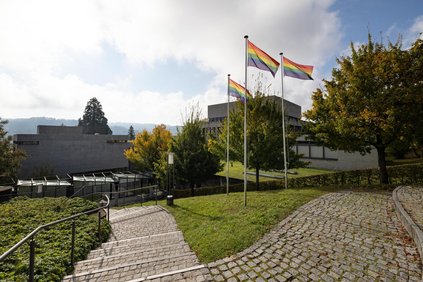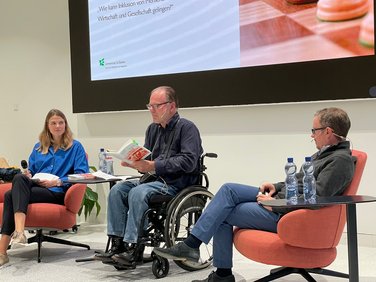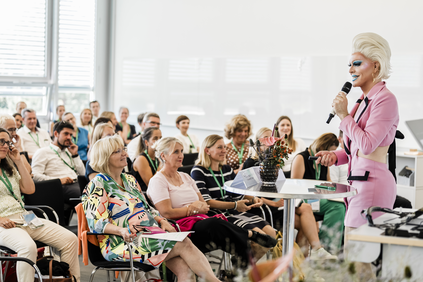Opinions - 12.06.2020 - 00:00
One year after the women's strike
Christa Binswanger reflects on the strikes that last year saw tens of thousands of women take to the streets and on care work during these past months during the Coronavirus.

12 June 2020. It has already been one year since the women's strike took place across Switzerland on 14th of June 2019. As a gender and diversity expert, I wanted to look back at the demands that were the focal point of these demonstrations and ask: Has Switzerland come closer to achieving the goals of equality today? Have the demands for social change been heard and implemented?
In 2020, Switzerland, along with the global community, has had to cope with the Corona crisis. We are all trying get through an experience that is unprecedented in our lifetime. Some of the questions that have arisen through this crisis are new to the organization of our social life, but others have remained that now stand out more clearly.
Valuing paid and unpaid care work
Back in the summer of 2019, a central demand of the women's strike was that both paid and unpaid care work should be much more highly valued. Last June 14, it was claimed, as often before, that this appreciation must be implemented by raising salaries and improving working conditions in the care sector. The Corona pandemic has once again shown us how important the nursing and extended care professions are, with many Swiss people showing their appreciation for these “first line” responders by standing on their balconies and clapping their hands in a coordinated manner. However, for most people working in the care sector, the situation has not improved, but during this pandemic, it has worsened.
Overworked and underpaid
Their working conditions have deteriorated, their working hours have been extended and the shortage of personnel in this sector has been offset by a greater burden on individuals. And all this has taken place without raising salaries or appreciating the extended working hours through additional wage components. At the same time, Swiss policy has clearly supported other sectors with aid packages: aviation being a prime example.
If we look at these socio-political practices from a gender perspective - in other words, if we ask what gender is over-represented and under-represented in this and other sectors, it becomes clear that there has been no improvement in the typical female occupations - in nursing, childcare and retail - so far. Examining the demands of last year's women's strike, politics and society are not (yet) prepared to upgrade paid care work - and to compensate for this by redistribution.
However, there are currently voices that are enunciating this demand very clearly. For example, an initiative of the Swiss Denknetz, with the participation of former Federal Councilor Ruth Dreifuss: a new social contract is needed that recognises care work as indispensable for a functioning economy, for a more gender-equitable society and for the sustainable use of natural resources. A core element is the material recognition of care work, which can be made possible through a redistribution of resources (www.denknetz.ch/care-gesellschaft).
A call to action
Nevertheless: The President of the Swiss Confederation Simonetta Sommaruga recently spoke out publicly in favour of a discussion on higher wages in so-called systemically important sectors - support for employees in care, day-care centers and the retail trade. Sommaruga believes that it is primarily the employers who have a duty. Wherever the public sector is an employer, this should also be considered (SWI Info, 24 April). In an open letter to the Parliament, the professional association of nursing professionals demanded higher wages, better working conditions and a strengthening of training. Among other things, they argued in favour of a COVID 19 allowance, as is the case in Germany (SWI Info, 24 April). Although these demands are currently being discussed, they have so far not been implemented or have been implemented inadequately.
And what about the demonstrations in the times of Corona? If we compare the strike activities of last June and the demonstrations against the Corona measures that took place in April and May 2020, there are parallels and differences. The parallels lie in the longing for a unifying community, for coming out of separation. The big difference compared to the women's strike of 2019 is that these people are mainly concerned that their individually defined demands are not being heard. It is not a matter of solidarity with a community or group - for example, with the concern that care work must be upgraded structurally, institutionally and monetarily - but rather the often seemingly desperate demand not to be neglected as an individual.
A balancing act
I am fully aware that during times of Corona individuals might be worried about themselves. Corona shows us our human vulnerability in all clarity. But it is imperative that we remain in solidarity with those who are most at risk. To claim individual rights at the cost of the most vulnerable is frightening and totally incompatible with the objectives of the women’s strike from June 2019. The Black Lives Matter movement, which is currently taking to the streets, is quite different: it is showing solidarity with people who are discriminated against because of the colour of their skin in Switzerland and worldwide, and it is showing solidarity with them.
It would be nice if we, as a society, will remain aware of our responsibility in times of the so called “new normality” now dawning: a responsibility with regard to care and care workers and with regard to particularly vulnerable groups. It would be nice if we could soon celebrate that care work, because of its indispensability for all of us, receives the appreciation it deserves.
PD Dr. Christa Binswanger is Permanent Lecturer in Gender and Diversity at the University of St.Gallen.
Image: photocase / Paulo Sousa
More articles from the same category
This could also be of interest to you
Discover our special topics
















